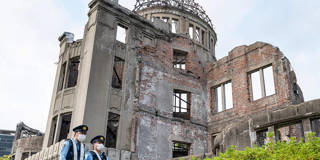The venue of this year’s G7 summit is a powerful symbol. With nuclear tensions rising, the summit’s participants must recognize the catastrophic consequences of such weapons and take four steps to strengthen the global norm against their use.
GENEVA – From May 19-21, the leaders of the G7 countries (Canada, France, Germany, Italy, Japan, the United Kingdom, and the United States) as well as high-level representatives from the European Union will meet in Hiroshima, Japan. Many of these leaders will be visiting the city, one of two where nuclear weapons were used in August 1945, for the first time. And since the nuclear threat is now higher than at any time since the end of the Cold War, they must not use this occasion to pass off the same decades-old non-proliferation measures as something new; rather, they must commit to concrete and credible disarmament measures based on the prohibition of nuclear weapons.
Japanese Prime Minister Fumio Kishida, who comes from a Hiroshima political family and had relatives who died in the 1945 bombing, decided to hold the G7 Summit in the city precisely because of its history. In light of Russia’s invasion of Ukraine and subsequent nuclear saber-rattling, maintaining international peace and pursuing nuclear disarmament will rank high on the agenda. Kishida also has an eye on the Korean Peninsula, where, in the early months of 2023, North Korea continued to ramp up missile testing, and the US and South Korea mounted joint military exercises involving nuclear-capable aircraft.
The global threat posed by nuclear weapons cannot be overstated. In terms of the scale of the devastation they cause and their persistent radioactive legacy, they are the most destructive, inhumane, and indiscriminate weapons ever created. Their use would have a massive environmental impact, and even a limited nuclear conflict would trigger widespread famine. In recognition of these far-reaching consequences, five of the nine nuclear-armed states affirmed in January 2022 “that a nuclear war cannot be won and must never be fought” – a statement echoed by G7 leaders in their communiqué from Elmau, Germany last year.

GENEVA – From May 19-21, the leaders of the G7 countries (Canada, France, Germany, Italy, Japan, the United Kingdom, and the United States) as well as high-level representatives from the European Union will meet in Hiroshima, Japan. Many of these leaders will be visiting the city, one of two where nuclear weapons were used in August 1945, for the first time. And since the nuclear threat is now higher than at any time since the end of the Cold War, they must not use this occasion to pass off the same decades-old non-proliferation measures as something new; rather, they must commit to concrete and credible disarmament measures based on the prohibition of nuclear weapons.
Japanese Prime Minister Fumio Kishida, who comes from a Hiroshima political family and had relatives who died in the 1945 bombing, decided to hold the G7 Summit in the city precisely because of its history. In light of Russia’s invasion of Ukraine and subsequent nuclear saber-rattling, maintaining international peace and pursuing nuclear disarmament will rank high on the agenda. Kishida also has an eye on the Korean Peninsula, where, in the early months of 2023, North Korea continued to ramp up missile testing, and the US and South Korea mounted joint military exercises involving nuclear-capable aircraft.
The global threat posed by nuclear weapons cannot be overstated. In terms of the scale of the devastation they cause and their persistent radioactive legacy, they are the most destructive, inhumane, and indiscriminate weapons ever created. Their use would have a massive environmental impact, and even a limited nuclear conflict would trigger widespread famine. In recognition of these far-reaching consequences, five of the nine nuclear-armed states affirmed in January 2022 “that a nuclear war cannot be won and must never be fought” – a statement echoed by G7 leaders in their communiqué from Elmau, Germany last year.